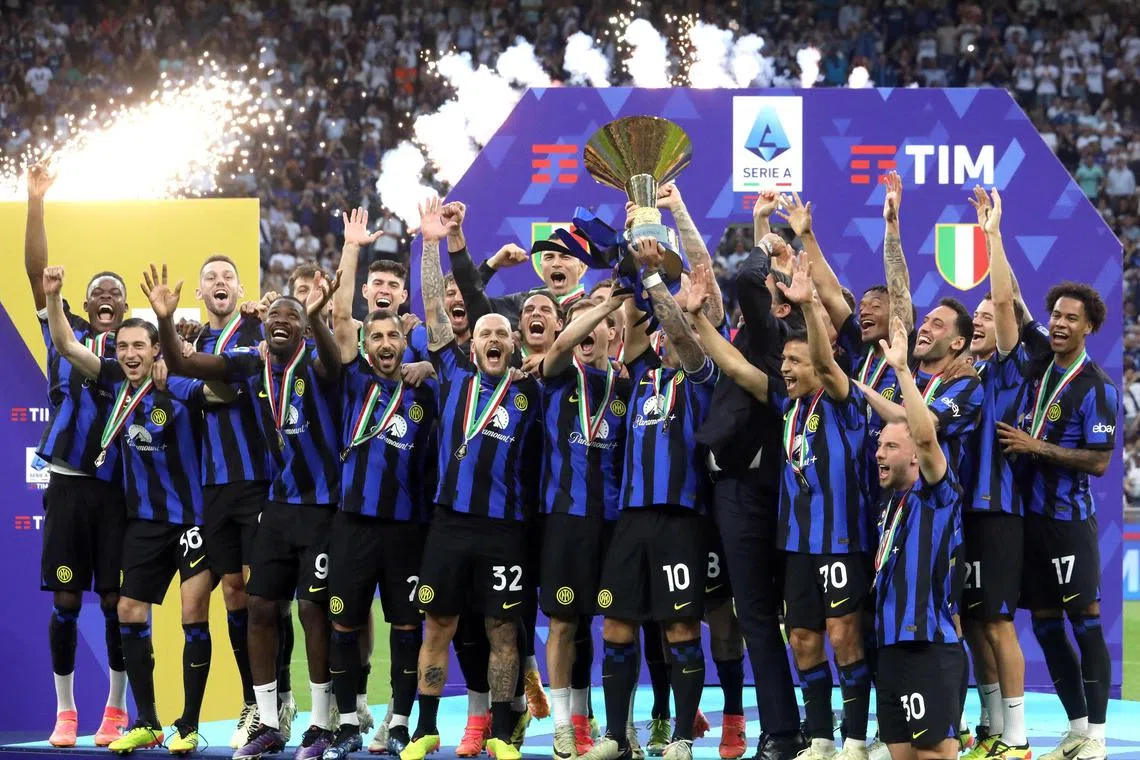Inter Milan was a billionaire plaything for China’s Suning, then the money ran out
Sign up now: Get ST's newsletters delivered to your inbox

Inter Milan’s team celebrates with the trophy for winning the Italian Championship.
PHOTO: EPA-EFE
New York - Soon after buying Inter Milan in 2016, Chinese retail billionaire Zhang Jindong installed his 24-year-old son to help run one of the most famous football teams in Italy.
Zhang Kangyang – who also goes by Steven – embraced his new role. A former analyst at Morgan Stanley, he was soon to be seen driving a Pagani Huayra BC sports car, worth over US$3 million (S$4 million), around the streets of Milan. On the spoiler were the words Nerazzurra – blue and black – referring to the colours of Inter Milan.
Two years later, he was made chairman. Aside from supporting the club at football games across Europe, Mr Steven Zhang became a regular fixture at Italy’s most sought-after social events, ranging from Formula 1 races to Gucci fashion shows.
Last month should’ve been his crowning achievement. On April 22, on a rainy evening in front of 75,000 fans in the San Siro stadium, Inter Milan won their 20th league title by beating hated city rivals AC Milan. But Mr Steven Zhang was absent from the directors’ box, as he had been all year, in part driven by a Hong Kong bankruptcy case. Instead, he appeared in a video on YouTube congratulating and thanking the club’s staff and players.
A month later, Suning, the retail company founded by the senior Zhang, lost control of Inter Milan after defaulting on a loan granted by Oaktree Capital Management, in an example of just how some of Europe’s greatest football clubs, in a bid to remain competitive, have crumbled under unsustainable debt and struggling owners.
China troubles
Mr Zhang had started with a small air-conditioning store in Nanjing, Jiangsu, and turned it into a retail conglomerate amid China’s economic boom. Suning.com became one of China’s biggest retailers of appliances, electronics and other consumer goods, diversifying into an array of businesses, from football clubs to property.
In 2016, Suning bought about 70 per cent of Inter Milan for €270 million (S$394 million). In an event to mark the takeover, a press conference was held in Nanjing. Buying control of the Italian club “helps Suning to capture the trend of sports and fitness interest in China, raise the standards of local football, and also raises Suning’s profile as it expands globally,” Mr Zhang said in a speech.
The deal didn’t come out of the blue. Chinese President Xi Jinping is an avid supporter of football, and planned to build a sports industry worth 5 trillion yuan (S$952 billion) by 2025. Chinese teams were some of the biggest spenders on talent in 2016, and a Chinese investor group was also pursuing the takeover of AC Milan.
Over the next few years, on the pitch at least, Suning’s reign was a success. Inter won the league twice, and reached the Champions League final. Off it, the club was a disaster, driven in part by troubles back home.
By 2021, Suning.com was in financial jeopardy, after investing in China Evergrande Group, the world’s most indebted property developer. A group of investors, led by the Nanjing state asset management committee and the Jiangsu provincial government, took a stake in the struggling firm, while Mr Zhang lost control of his own firm.
Suning was a major sponsor of Inter, with €260 million in revenue coming from Chinese entities – equivalent to a quarter of total sales – between 2017 and 2019 from regional sponsoring deals. But when Suning ran into financial trouble, the money also stopped flowing to Milan. After the pandemic, the club even failed to pay regular salaries to its players after sponsorship payments dried up.
By then, Mr Xi’s footballing dream had also died. China’s men’s football team had performed woefully in major tournaments, local clubs tied to real estate developers had been dragged into wider financial crises, and Chinese backers of foreign teams were selling out.
Mr Zhang was worth about US$6 billion when he bought Inter Milan in 2016. The takeover by Oaktree has wiped out his fortune, according to the Bloomberg Billionaires Index.
Despite the disastrous financial ownership of Suning, Inter Milan has ballooned in valuation, driven in part by its on-pitch performance and a global boom in sporting assets.
Inter Milan’s enterprise value is between €1.36 billion and €1.49 billion, according to Mr Andrea Sartori, founder and chief executive officer of data platform Football Benchmark. Since his firm started to track valuations of football clubs in 2016, Inter’s has grown more than 200 per cent, beaten only by Tottenham Hotspur and Paris Saint Germain.
“Oaktree got a good deal because they took control of a club that is worth significantly more than its liabilities,” said Mr Sartori.
Oaktree’s challenges will be to achieve financial sustainability without losing out on the pitch, and finding an eventual buyer for the club. BLOOMBERG


